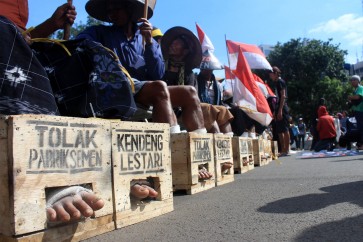Popular Reads
Top Results
Can't find what you're looking for?
View all search resultsPopular Reads
Top Results
Can't find what you're looking for?
View all search resultsEDITORIAL: Cementing options for people
The Kendeng people’s protest is a real test of Jokowi’s pro-people credentials.
Change text size
Gift Premium Articles
to Anyone
O
pposition to government policies is normal in a democracy like Indonesia, where setting public policy even at the lowest, subdistrict level involves consulting with people as the most affected party. Consultation definitely has its limits, but wisdom does not, in particular if a policy could harm not only the people but also nature, as in the case of the controversial plan to build a cement factory in the Central Java regency of Rembang.
It is not because of the death of Patmi, a 48-year-old woman who joined fellow Kendeng farmers in a protest outside the State Palace, that the government should put the cement factory project on hold until the cause of the farmers is fully addressed.
The problem with the cement factory is that it is legally flawed — after the Supreme Court ruled last October in favor of the farmers and ordered state-owned cement producer PT Semen Indonesia to cease its activities.
While the Supreme Court ruling is final and binding, especially because it gives no more room to the government to contest the matter, the government’s ignorance of the decision only demonstrates its disrespect for the rule of law, which it ironically has consistently been advocating. Worse still, the government’s failure to comply with the Supreme Court ruling will create legal uncertainty, one of the key challenges facing the country’s quest for legal reform.
It was the absence of legal certainty, or justice undelivered, that led the farmers to come to Jakarta last week for a five-day protest, which saw dozens of Kendeng women encase their feet in concrete. It was probably an expression of desperation after their calls for Central Java Governor Ganjar Pranowo to revoke a new environmental permit for the state company fell on deaf ears. The protest may also serve as a last-ditch effort to get President Joko “Jokowi” Widodo’s attention as State-Owned Enterprises Minister Rini Soemarno has said the President will inaugurate the project next month.
One of the women protesters, Patmi, died of a suspected heart attack on Tuesday. But no matter what caused her death, the government will be blamed for this unexpected incident and therefore come under mounting pressure to deal with public opposition to the cement factory.
Rejection of the plan has grown wider and involves not only locals but also state institutions, such as the Indonesian Institute of Sciences (LIPI) and the National Commission on Human Rights, not to mention prominent Muslim cleric Mustofa Bisri.


















